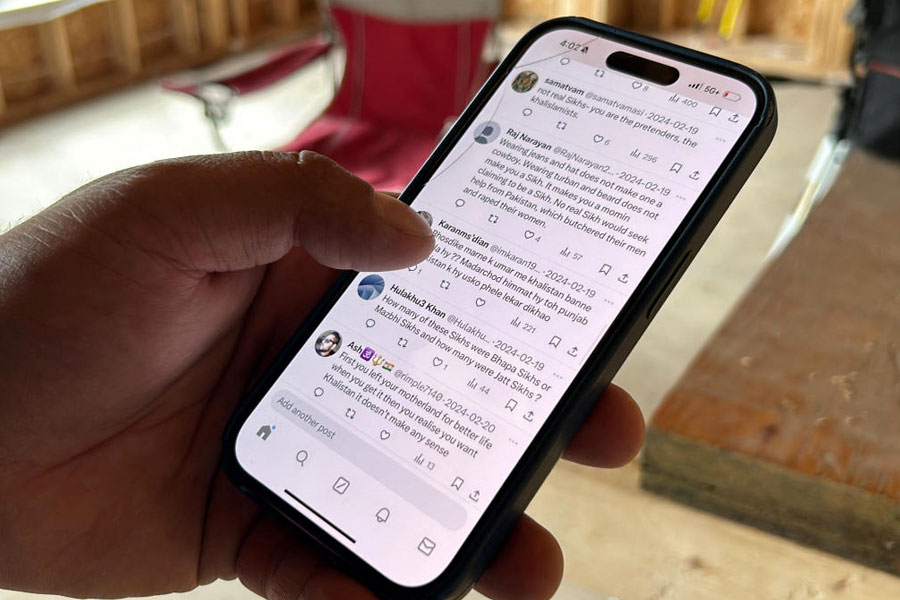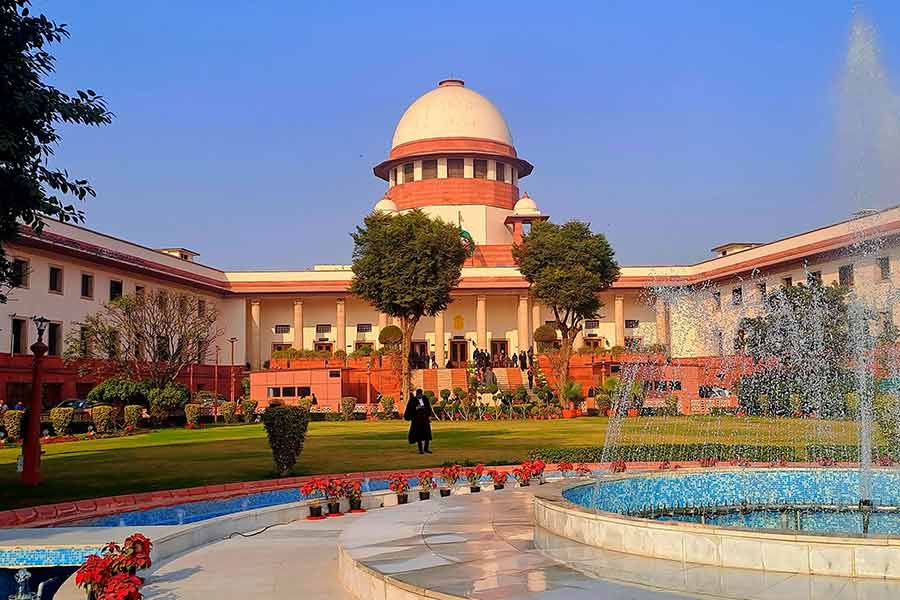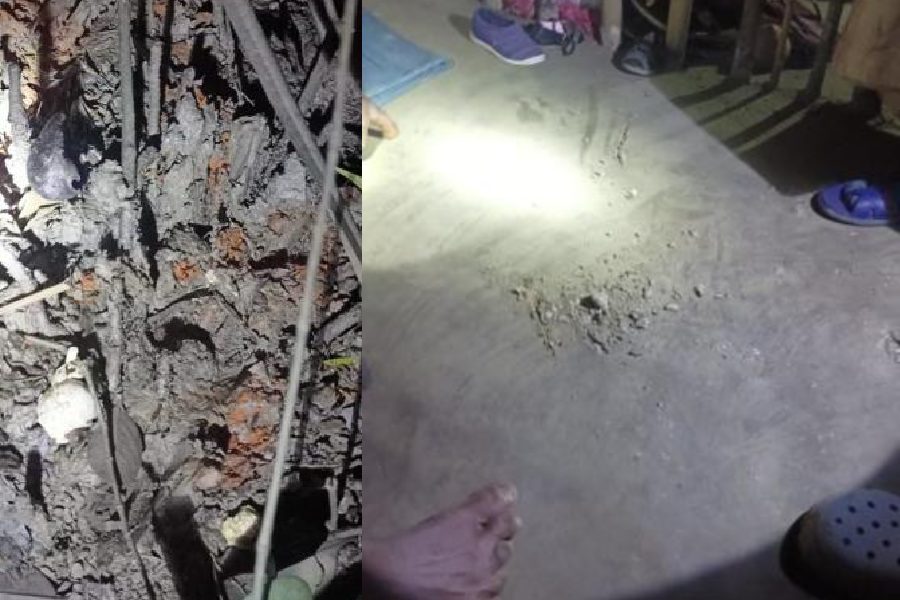As a physician specializing in addiction, Dr. Jasmeet Bains, the first Sikh American elected to the California assembly, was used to risky situations.
Even so, Bains said she was shocked when four men came to her office in August last year, shortly after California adopted her resolution declaring the killing of thousands of Sikhs in India in 1984 a genocide. The men, who appeared to be of Indian origin, warned they would "do whatever it takes to go after you," Bains said.
The threat was just the beginning.
Since last summer, Bains said, she has received more than 100 threatening text messages. She spotted someone taking photos of her Bakersfield home from a parked truck, and the lock on her mailbox was broken repeatedly.
Bains reported the incident at her office to the local police, and the surveillance of her home to the state assembly Sergeant-at-Arms. Reuters did not review the text messages. In late September, after Canadian Prime Minister Justin Trudeau said his administration had credible evidence that the Indian government was involved in the killing of a Sikh separatist leader in British Columbia, Bains said the Sergeant-at-Arms conducted a security assessment at her home and urged her to take precautions. The FBI contacted her about the threats in her office in October, Bains said.
Bains said she began screening phone calls and avoiding traveling alone. She occasionally requests a security detail while attending official events.
"My life has changed," she told Reuters. "I don't go anywhere alone anymore. I make sure my staff is with me at all times, which is hard for someone as independent as me."
Reuters spoke to 19 Sikh community leaders, including three elected U.S. officials, who said that they or their organizations have been targeted with threats and harassment in the United States and Canada over the last year – even as law enforcement agencies pursue criminal investigations into the killing of a Sikh separatist leader in Canada and the foiled assassination attempt of another separatist leader in the U.S.
The Sikhs Reuters spoke to described experiencing online harassment; surveillance at their homes and places of worship; the release of personal details online or doxxing, and "swatting," filing a false police report to trigger a law enforcement response.
Seven Sikh activists told Reuters that the FBI or the Royal Canadian Mounted Police warned them last year their lives could be in danger, without specifying the source of the threat.
An FBI official said the bureau issues such warnings when it receives credible evidence of a threat, but declined to comment further. Canadian federal police declined to confirm how many individuals were issued duties to warn. The FBI also warned the Sikh community more broadly about "transnational repression," efforts by a foreign state to intimidate or threaten political opponents in another country, releasing a public service announcement in Punjabi urging people to report threats or harassment. It also held two invitation-only meetings for Sikh advocacy groups, FBI officials and participants said.
US and Canada investigate
Meanwhile, four Indian nationals are facing charges of murder and conspiracy in Canada for the June 2023 fatal shooting of Sikh separatist Hardeep Singh Nijjar outside his gurdwara, a Sikh place of worship, in Surrey, British Columbia.
Attorneys for the four men did not respond to requests for comment. Separately, the U.S. Justice Department has charged Indian national Nikhil Gupta with trying to arrange the murder of separatist leader Gurpatwant Singh Pannun at the behest of an Indian intelligence official. Gupta pleaded not guilty and is awaiting trial in New York. His attorney declined comment.
India has denied involvement in Nijjar's killing and the attempted assassination of Pannun. It has pledged to investigate the plot against Pannun, but not Nijjar.
"Nijjar was someone who was a designated terrorist," Sanjay Kumar Verma, India's High Commissioner to Canada, told Reuters in an interview in June. "For him I have no love lost."
Many of the threats described to Reuters by the Sikh activists originated from anonymous accounts on X. Others came from unknown phone numbers and anonymous text messages, they said.
Reuters was unable to determine the origins of the threats.
At least six activists said they suspect that India's government or its supporters could be behind the harassment, though they acknowledged it can be hard to prove - especially when the threats come from anonymous parties. Kanwarpal Singh, political secretary of the Punjab-based Dal Khalsa group, which lobbies for a separate state, has accused Prime Minister Narendra Modi's government of trying to defame and isolate Sikh separatists. He did not specify whether he was referring to separatists in India or abroad.
The Indian embassy in Washington and Modi's office did not respond to repeated requests for comment. Verma did not respond to an email on questions about threats against Sikh separatists and other activists or the criminal cases in Canada and the United States.
In a call with Reuters, two FBI officials who spoke on the condition of anonymity did not comment directly on India's possible role in transnational repression. One said they "look across a really broad range of aggressive countries."
The FBI officials said it can be difficult to determine whether threats are emanating from a foreign government or criminal elements using similar tactics to try to extort victims. Like Nijjar, Pannun is a proponent of a fringe demand to secede from India and carve out an independent state called Khalistan. The movement led to a violent insurgency in India's Punjab state in the 1980s and 1990s before it was crushed by Delhi.
Time to 'plan your murder'
Pannun said he continues to receive violent threats online, even after the Justice Department made public the assassination plot last November.
"Wherever you run, I will come there, enter it and kill you," according to a May 7 email in Hindi reviewed by Reuters. In April, the X account @randomatheist_ wrote to Pannun: "Polonium-210 arrived in DC," in an apparent reference to the toxic radioactive isotope used to kill former Russian spy Alexander Litvinenko.
Pannun's organization Sikhs for Justice has a Washington, D.C. office.
X did not respond to requests for comment.
Pannun referred further questions about the threats to U.S. law enforcement.
In 2019, India declared Sikhs for Justice an unlawful association, citing its involvement in extremist activities. Pannun and 15 other members of the organization were charged with terrorism-related crimes a year later, including trying to encourage a mutiny in the Indian army.
Pannun denies the allegations.
Pritpal Singh, a supporter of a separate Sikh state and founder of American Sikh Caucus Committee, an advocacy group that has not taken a position on secession, also told Reuters the threats and surveillance continued after he received an FBI warning last June. A few days after the warning, he said, a strange car pulled up and surveilled his California home. He said he noticed a second instance of surveillance in November. The episodes were captured on home security cameras, and the video was reviewed by Reuters. Pritpal said he reported the surveillance to the FBI.
On the June 18 anniversary of Nijjar's killing, one account on X wrote in Hindi that it was time to "plan your murder." Another X account wrote: "RIP Pritpal." Reuters saw screen shots of both messages, which his family reported to the FBI.
'A kind of worst-case scenario'
Nate Schenkkan, senior director of research at the Washington, D.C. non-profit Freedom House, which monitors global civil liberties, said the campaign represents "a kind of worst-case scenario for transnational repression — when a major state acts completely outside the law using all the tools at its disposal to silence dissent in another country."
He said India appeared to have disregarded the potential diplomatic, legal and political consequences of the campaign, pointing to the prosecutions underway in the U.S. and Canada.
Harjap Singh Japhi, a grocery store owner in Greenwood, Indiana who was charged by India with terrorism-related crimes for his prior involvement with Sikhs for Justice, told Reuters that in the fall of 2022 FBI agents came to his home asking about his possible involvement in a bombing in the late 1980s.
The agents told him India had sent the bureau some records related to the attack.
Japhi, 44, said he was a child at the time.
Japhi's wife Rajvinder Shokar also told Reuters about the visit by the FBI.
FBI officials told the news agency that they could not comment on Japhi's case, and Reuters could not independently confirm the account of the bombing or the visit to the couple's home.
False referrals are a common feature of transnational repression, the FBI said, and the agency is working with local law enforcement agencies on how to scrutinize referrals -particularly if the target is a political opponent.
A day after Nijjar's killing, Japhi said he received an anonymous phone call from someone purporting to be a member of an Indian organized crime group warning him he was next.
In December, a since-deleted X account doxxed Japhi by posting his residential and business addresses and local health department inspection records online, according to screen shots shared with Reuters.
Japhi said he reported the threatening phone call and the doxxing to the FBI.
Bains told Reuters she isn't sure whether she experienced transnational repression by the Indian government.
In May, the California Assembly passed a bill she introduced that would train state law enforcement to identify and respond to transnational repression.
"If I'm experiencing it, more people are experiencing it," she said. "And that impacts everyone, not just the Sikh community."










